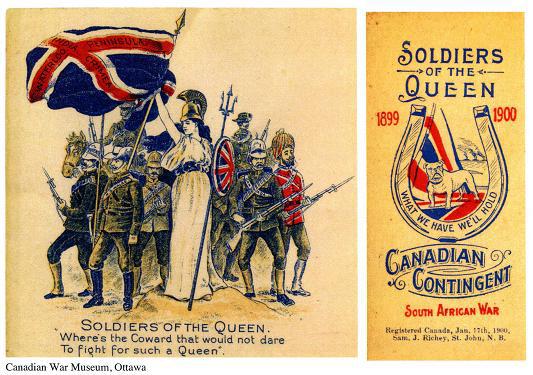Boer War (1899)
“Boer War Era Postcard (c. 1899-1900)” by Canada War Museum
Between 1899 and 1902, more than 7,000 Canadians fought to strengthen Britain’s position in southern Africa. The war was devastating for the Boer (descendants of Dutch settlers). As part of a scorched-earth campaign, the British-led forces burned their crops and homesteads and poisoned their wells. About 200,000 Boer were rounded up and sent to concentration camps. Twenty-eight thousand (mostly children) died of disease, starvation, and exposure in these camps.
In Another Kind of Justice: Canadian Military Law from Confederation to Somalia (1999), Chris Madsen points out that, “Canadian troops became intimately involved in the nastier aspects of the South African war.” Whole columns of troops participated in search, expel and burn missions. Looting was common. One Canadian soldier wrote home, “as fast as we come up the country … we loot the farms.” There are also numerous documented instances of Canadian troops raping and killing civilians.
As with the Boer, the war was devastating for many Africans. Over 100,000 Africans were held in concentration camps, but the British failed to keep a tally of their deaths, so it is not known how many died of disease or starvation. Some estimate that as many as 20,000 were worked to death in camps during the war.
Unlike the Boer, the Africans’ plight did not significantly improve after the war. In Painting the Map Red: Canada and the South African War, 1899-1902 (1998), Carman Miller notes, “although imperialists had made much of the Boer maltreatment of the Blacks, the British did little after the war to remedy their injustices.” In fact, the war reinforced white/British dominance over the region’s indigenous population. The peace agreement with the Boer included a guarantee that Africans would not be granted the right to vote before the two defeated republics gained independence. In The History of Britain in Africa: From the Fifteenth Century to the Present, John Charles Hatch explains: “By the time that self-government was restored in 1906 and 1907, they [Boer] were able to reestablish the racial foundations of their states on the traditional principle of ‘No equality in church or state.’” Blacks and mixed race people were excluded from voting in the postwar elections and would not gain full civil rights for nine decades.

